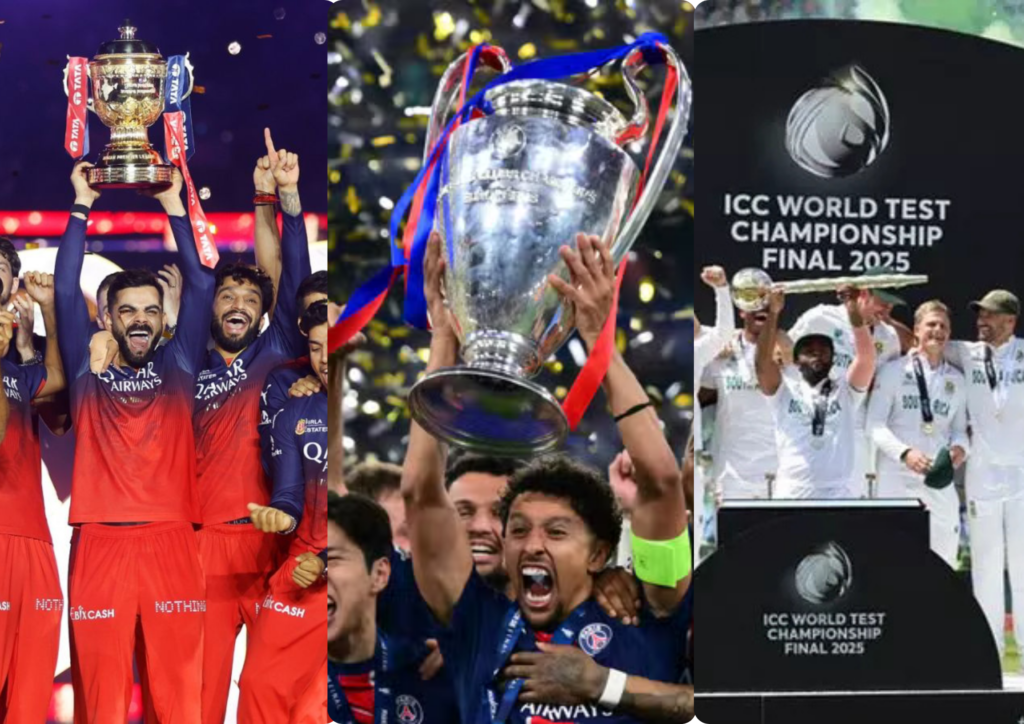In 2025, three sports giants—Royal Challengers Bengaluru (RCB), the South African cricket team, and Paris Saint-Germain (PSG)—finally shed their long-standing reputations as underachievers. After years, even decades, of heartbreaks and near misses, they each lifted a major trophy, sending waves of emotion through their fans and rewriting narratives around pressure, performance, and perseverance.
These weren’t fluke wins. They were carefully earned victories that highlight how teams evolve—not just tactically, but mentally and emotionally.
So what finally clicked? Why do elite teams, with access to the best coaches, facilities, and players, still take so long to win? What’s the role of pressure, subconscious baggage, or team culture in delaying success?
Let’s explore this with MyMentalCoach, what truly changed—and what this means for high-performance teams globally.
RCB: 18 Years of “Ee Sala Cup Namde” Finally Realized
RCB’s journey has been one of the most emotional in IPL history. After being runners-up three times and often mocked for falling short despite a star-studded lineup, they finally won the IPL 2025 title.
What changed?
- They shifted focus from star power to balance and depth. Nine different players won Man of the Match awards, showing how responsibility was spread across the squad.
- Rajat Patidar’s captaincy brought a fresh mindset, moving the spotlight off Virat Kohli and allowing the team to play with more freedom.
- The once-haunting slogan “Ee Sala Cup Namde” (This time the cup is ours) became a source of belief, not burden.
RCB’s success came from years of frustration, learning, and ultimately, culture transformation.
South Africa: From ICC “Chokers” to World Champions
The South African cricket team’s win at the ICC World Test Championship 2025 marked the end of a painful narrative that followed them since the 1990s. Labeled “chokers” after repeated knockout-stage collapses, this time, they were different.
- A balanced squad with experienced leaders like Aiden Markram and a confident younger generation gave the team composure.
- They handled high-pressure moments with calm and clarity, proving that mental toughness and long-term leadership planning matter as much as raw skill.
- Most importantly, they didn’t run from their past—they grew from it.
PSG: Finally Winning the Champions League, Without the Superstars
After years of relying on global superstars like Messi, Neymar, and Mbappé—PSG won the UEFA Champions League in 2025 with none of them on the field.
What changed?
- Coach Luis Enrique reshaped PSG into a system-first team, built on discipline, pressing, and tactical cohesion.
- The club underwent a cultural reset, focusing on team chemistry over individual brilliance.
- Without the pressure of high-profile egos, players thrived in their roles, and the group performed like a unit, not a collection of icons.
This wasn’t just a win. It was a statement on how structure, clarity, and belief in process can lead to the highest levels of success.
Why Do Some Teams Take Years Before Their First Win
1. Cultural Inertia
Every team carries a cultural DNA—ways of thinking, reacting under pressure, and handling failure. Over time, if a team has repeatedly fallen short, that losing identity quietly settles in. Players start to internalize a subtle script: “Maybe we’re just not meant to win.”
These ingrained patterns become hard to shake unless leadership actively rewires the mindset. It’s not just about changing a few tactics—it’s about shifting how a team sees itself. Without that intentional change, teams can keep repeating history, even with new talent.
Example: For years, Royal Challengers Bangalore (RCB) were labeled as underachievers, despite having star-studded lineups. That tag became part of the club’s psychological narrative—until fresh coaching voices and a more process-oriented approach started breaking that loop.
2. Player Turnover Cycles
Every successful team goes through seasons of transition. When legends retire or move on, newer players must step up—but building synergy and trust doesn’t happen overnight.
Young squads may have the energy but lack big-match experience. Veteran-heavy squads may bring composure but struggle with intensity or modern pace. Until a team finds that balance—a mix of composure, hunger, and chemistry—it usually remains a work in progress.
Think of it like this: You can’t microwave a championship team. Cohesion takes time to simmer.
Example: South Africa’s men’s cricket team had golden generations but struggled with timing. This year’s ICC Trophy win was the result of learning across player generations, finally combining experience and youth into a winning formula.
3. Pressure Narrative Loops
The more a team fails, the more the world watches. The more the world watches, the more pressure builds. And eventually, pressure becomes a story in itself.
This loop is dangerous: teams aren’t just playing opponents—they’re battling ghosts of the past. A missed opportunity isn’t just a moment—it becomes yet another chapter in a saga of heartbreak. That weight suffocates performance.
But here’s the twist: once a team finally breaks through, the story rewrites itself. The ghosts lose power. Confidence becomes self-fulfilling.
Example: South Africa carried the painful “chokers” tag for decades, with every ICC exit deepening the narrative. The more they came close, the more pressure they faced. But in 2025, they finally broke the loop by winning the World Test Championship Final against Australia. That win didn’t just bring silverware—it brought freedom. A mental reset. The label lost meaning, and belief took its place.
4. Lack of System Focus
Talent alone doesn’t win titles. Structure does.
Many teams rely too heavily on individual brilliance. But in high-pressure environments, systems carry you when stars falter. A system ensures consistency, clarity, and repeatability—especially when chaos hits.
When teams start building processes around collective strength—not just a few standout players—they create stability. They reduce variance. They grow resilience.
Example: RCB’s turnaround wasn’t sparked by just one superstar—though Virat Kohli’s consistency and leadership foundation played a big role. The real shift came when the franchise doubled down on bowling depth, defined player roles clearly, and backed the younger generation across the squad. This structural evolution—beyond just star power—is what finally helped them break their IPL drought.
5. Mental Toughness Development
Great teams aren’t just technically strong—they’re mentally seasoned. They know how to handle the silence before a penalty kick, the tension of a final over, or the nerves before a big final.
This kind of composure isn’t built in practice nets or training sessions alone. It’s built in the furnace of repeated failures, close losses, and emotional recovery.
Championship teams aren’t fearless—they’re trained to move forward despite the fear.
Example: South Africa has long battled the “chokers” tag. But this time, their players walked in with a new calm, built from years of scars. Their ICC triumph wasn’t just a win—it was a psychological breakthrough.
Why & How Did They Finally Win?
Confidence Becomes Contagious
Once a team finally wins a big title, something shifts. It’s not just about the trophy—it’s about belief. For years, teams like RCB, South Africa, and PSG were told they “can’t win the big one.” That narrative stuck, and over time, it created hesitation in key moments. But the moment they finally broke the streak, confidence kicked in. Players started trusting each other more. The dressing room energy changed. Confidence isn’t just about individual self-belief—it spreads like wildfire through the squad, staff, and fans.
New Players, New Energy
When old patterns don’t work, sometimes you need new people to break them. That’s what “squad evolution” means. A fresh batch of younger, hungry players often brings different energy to the team. They’re not burdened by past failures. They’re motivated, fearless, and sometimes unaware of the historical baggage. Mixing young talent with the right experienced players can create the perfect balance to push through tough matches.
A Shift in Mindset
For years, teams under pressure fear losing more than they focus on winning. That fear blocks performance. But something happens when teams start accepting pressure as part of the game. It’s no longer something to avoid—it becomes something to master. South Africa’s T20 World Cup win, RCB’s WPL title, and PSG’s long-awaited UEFA success all reflect a mindset shift: they stopped fearing the moment and started owning it.
Changing the Story
Every long-suffering team has a story fans repeat: “We always choke,” “We never win finals,” “This isn’t our year.” Over time, this becomes the team’s identity—sometimes even a joke. But when the team finally wins, that story flips. RCB’s “Ee Sala Cup Namde” chant used to be a meme. Now, it’s a statement. Changing the story doesn’t just motivate the players—it unites the fans and builds a whole new kind of pressure: positive pressure.
Fresh Leadership, Clear Direction
When a team stays stuck for years, often the issue isn’t talent—it’s leadership. Whether it’s a captain on the field or a coach off it, leadership defines the team’s direction and character. A new captain with calm composure or a coach with a long-term plan can break old habits. Strong leadership doesn’t just bark instructions; it sets culture, builds trust, and creates clarity when things get chaotic.
Long-Term Thinking Pays Off
Winning teams don’t just show up one day and suddenly become champions. There’s a clear, long-term plan in place. Who to sign, how to develop players, what style of play to commit to—all of it matters. Teams that focus only on the “big star” often fizzle out under pressure. But teams with structure and a system—like South Africa focusing on all-round balance, or PSG slowly building squad depth—create consistency. And consistency wins trophies.
So, What’s the Conclusion?
Great teams aren’t born—they’re built, broken, and rebuilt over time. The droughts, the heartbreaks, the close calls—they’re not signs of failure, but chapters in a longer story of resilience. When it finally clicks—when belief replaces doubt, when systems align, and when the mindset shifts—everything changes.
So whether you’re a fan who’s waited for years, a coach trying to turn things around, or an athlete chasing that elusive win—remember this: the journey may test you, but the breakthrough always makes it worth it.
The trophy eventually comes. And when it does, it’s not just victory. It’s redemption.


